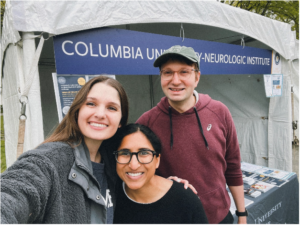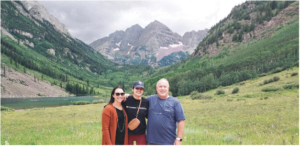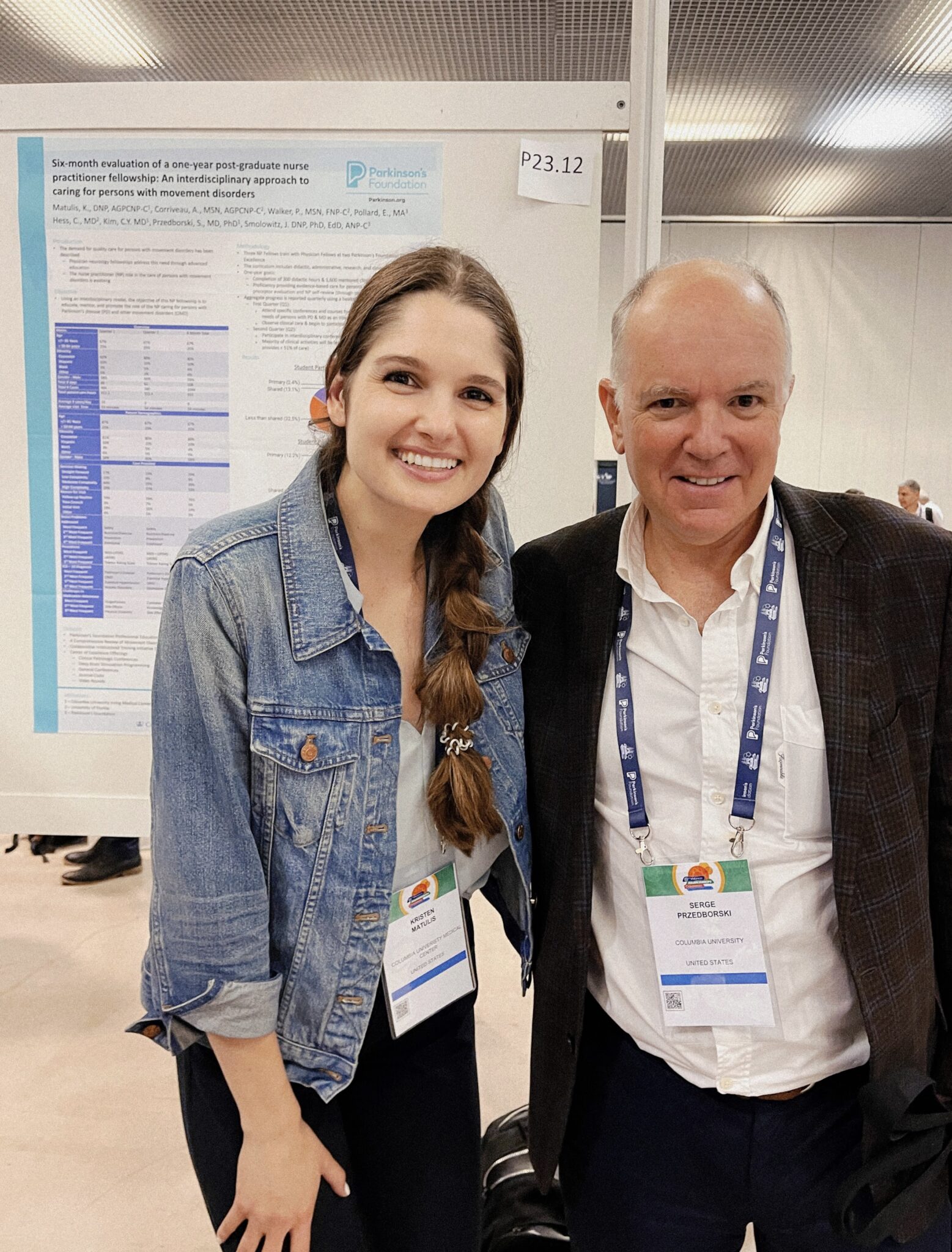An interview with Kristen L. Matulis: The Story of a Nurse Practitioner in Movement Disorders: Advocacy and the Role of Advanced Practice Providers (APPs) on December 7, 2023 by George Ackerman, Ph.D, J.D.

Biography
My name is Kristen Matulis and I hold a Bachelor of Science in Nursing from The University of Texas at Austin and a Doctor of Nursing Practice from the University of Minnesota. I am a certified adult and gerontological nurse practitioner and has practiced in a variety of specialties throughout her career, including cardiology, gerontology, and neurology. I am a graduate of the Parkinson’s Foundation’s (PF) inaugural Movement Disorders Nurse Practitioner (NP) Fellowship program, which concluded in June of 2023, and I practice in the Movement Disorders Division at The Neurological Institute of New York, NewYork-Presbyterian/Columbia University Irving Medical Center in New York, New York.
- Can you tell me more about your organization?
Columbia University Irving Medical Center’s Division of Movement Disorders has been designated a Center of Excellence by the Parkinson’s Foundation. This award acknowledges our excellence and leadership in research, comprehensive care, professional education, and patient outreach. In addition to the latest medications and treatments, our center also offers comprehensive support services to improve your quality of life.

- What is your passion and how did you get involved in Parkinson’s awareness and hope for a cure?
My clinical focus is in neuromodulation in Parkinson’s disease, specifically deep brain stimulation (DBS), and my passions center in nurse practitioner specialty education in the field of movement disorders. I became involved in Parkinson’s awareness by completing the Parkinson’s Foundation’s inaugural Nurse Practitioner Fellowship. By completing this subspecialty education program, my eyes were opened as to the role that nurse practitioners play in promoting the advocacy and awareness of Parkinson’s disease through the holistic model that is nursing care.
My nurse practitioner co-fellows, who completed the Parkinson’s Foundation’s inaugural NP Fellowship program with me are: Abby Corriveau, MSN, APRN, AGPCNP-C and Patrick Walker, MSN, APRN, FNP-C.
- What type of goals do individuals with Parkinson’s have when working with you?
My patients oftentimes have a goal of improving their overall quality of life through comprehensive treatment that is offered at our center. Each patient is different in how this will be achieved (whether we need to focus on the management of motor symptoms, non-motor symptoms, or other challenges being faced throughout the day-to-day).
- What type of training and how long are the programs?
The Parkinson’s Foundation’s inaugural Nurse Practitioner Fellowship program was a one-year pilot program centered in the subspecialty education of nurse practitioners in the field of movement disorders.
- What effect can it have on an individual with Parkinson’s?
The training of nurse practitioners in the field of movement disorders, particularly Parkinson’s disease, is so important because nurse practitioners are a vital part of the multidisciplinary care team involved in the care of our persons with Parkinson’s disease. Nurse practitioners bring holistic, patient-centered care to the table. Ideally, having these providers trained in movement disorders and involved in the care of individuals with PD can help improve quality of life for each patient.
- What would you like to see as a future goal for your programs?
In the future, our goal is for this year-long fellowship program to be accredited so the program may be replicated across Parkinson’s Foundation Centers of Excellence and to smaller centers where it is all the more necessary for NPs to be trained. This way, patients in more remote areas may receive access to a provider trained in movement disorders in the care of their Parkinson’s disease. Additionally, our hope is that the program will be able to continue forward once additional funding is obtained. Our goal is to continue to train additional nurse practitioners through this unique program opportunity.
- What events do you participate in?
Through fellowship, we participated in a number of community-based outreach programs. Perhaps my most profound experience was participating in the PD Unity Walk in Central Park in the Spring of 2023. It was an incredible event and it showed me just how strong our New York City community of people of Parkinson’s and their care partners truly is.
- How does this also assist the caregivers?
Nurse practitioners provide patient-centered care that is also geared toward patient advocates, care partners, and caregivers. At each of my patient’s visits, I’m also speaking with care partners about their needs so we can work together to provide the support that is needed. The Parkinson’s Foundation’s nurse practitioner fellowship program provided education to our fellows regarding the importance of caring for our caregivers, in addition to our patients with Parkinson’s disease.
- How can someone get in touch? What is your website?
LinkedIn: https://www.linkedin.com/in/kristen-matulis-dnp-aprn-agnp-c-668a5a1ab/.
Additionally, to reach me through our Movement Disorders Division at NYP/CUIMC, the information is provided here: https://www.neurology.columbia.edu/profile/kristen-l-matulis-dnp.
- How can others also become advocates for awareness?
I think the best way to become an advocate is to seek-out individuals and organizations within the Parkinson’s community who are working towards advocacy. Although it’s certainly possible to advocate individually, there is certainly strength in numbers! Together, we are a tour de force, if you will.
- In your opinion what is the key to effective advocacy?
I think that Ray Dorsey, MD, Todd Sherer, PhD, Michael Okun, MD, and Bastiaan Bloom, MD, PhD capture it best in their book, titled: A Prescription for Action: Ending Parkinson’s Disease. They write, “To prevent and end this disease, we must be aggressive, charismatic, bold, and willing to change the status quo.” In the book, people with Parkinson’s are encouraged to be loud, organize & mobilize together and clinicians are encouraged to train more specialists and educate multidisciplinary team members (as has been done through PF’s fellowship program for nurse practitioners).
- How can we better fundraise to support a cure for Parkinson’s?
I think the best way to fundraise is through the mobilization of our community – joining together to fundraise for research and to support our persons with Parkinson’s disease in our communities. I think sharing our stories is one of the most effective ways to achieve this (which is exactly what Together for Sharon is doing)!
- What other activities do you undertake to help improve and support your daily living (e.g. exercise and alternative remedies)?
I live near my current workplace, so walking to and from work in New York City is the primary way I support my own daily living. I use this time to listen to music (or a podcast) and get some fresh air & exercise. The goal is to center myself before I enter my office (even in the winter months when it’s chilly). Thus, when I walk through the doors of The Neurological Institute each day, my own worries & concerns are left at the threshold, and I can be present for my patients as I help them fight their own battles as they navigate their diagnoses.
- Why should people who don’t have Parkinson’s care about this?
The number of individuals affected by Parkinson’s disease in the United States, and globally, continues to grow. Together, we don’t need to see the increase in this neurological illness as inevitable. If we overcome indifference and collectively use our voices to advocate for solutions to fight this illness, it may not be as prevalent in the future. Thus, those who do not currently have Parkinson’s disease, or a loved one with Parkinson’s, may never need to experience this themselves.
- Have you had any family members or relatives affected by Parkinson’s disease.
I have not.
- If you had one song that would tell us more about you or represent your life, which song would it be?
I am a big fan of Taylor Swift; she has been my favorite artist since 2006. At this time, one of my favorite songs is You’re On Your Own, Kid. In the final moments of the song, Taylor sings the following: “You’ve got no reason to be afraid. You’re on your own, kid. Yeah, you can face this.” I listened to this song often at the height of my fellowship training, as it offered some solace when I felt uncomfortable, considering my knowledge deficits during my training. When I listen to it now, it’s a reminder that my patients are facing challenges, but they have support in myself as their nurse practitioner (and through our entire team), as they face their individual experience in their diagnosis of Parkinson’s disease. They might be “on their own” (so to speak) as they navigate their diagnosis, but our team is present at all points to offer the support and care that they need.
- If you had one final statement or quote you could leave for the Parkinson’s community, what would it be?
When I first picked-up the book, which I mentioned earlier, titled: A Prescription for Action: Ending Parkinson’s Disease, I found the dedication particularly profound. The authors write, “To those who bear the burden of Parkinson’s disease and to those who will help end it.” I think of this quote often, as I think it captures the urgency in our advocacy and captures the importance behind training more providers who will care for our persons with Parkinson’s and will also contribute to research developments that will help end this disease.

